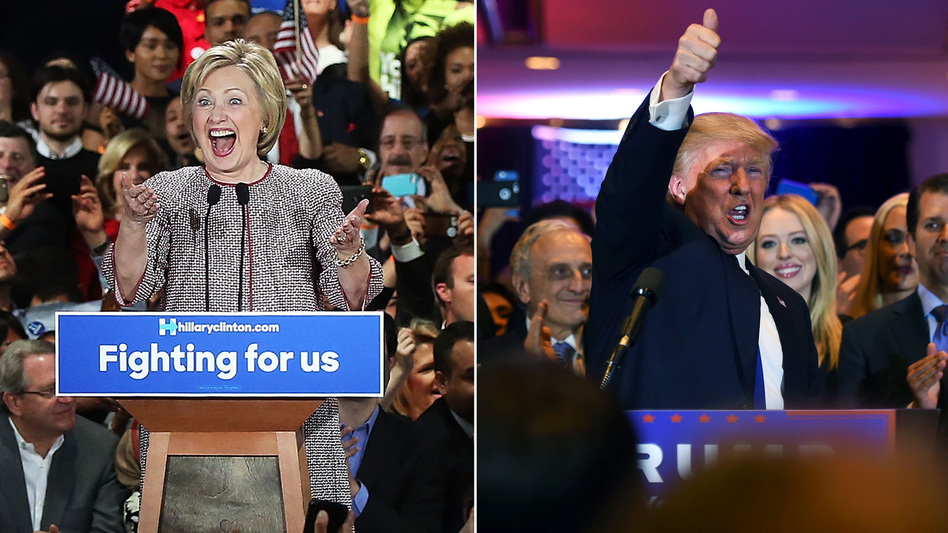
ELECTION ANALYSIS BY KAREN OCAMB | James Carville, strategist for Arkansas Gov. Bill Clinton in his 1992 race against President George H. W. Bush, used the term “the economy, stupid” to keep the campaign focused on the theme that eventually helped them win the nail-biting election.
This year, there is no such dominant theme, except perhaps the sloganeering by populist candidates Bernie Sanders and Donald Trump that the Establishment is “corrupt,” “the system is rigged,” and their respective opponents are unqualified and unworthy to be president.
This year the theme is: “it’s the math, stupid.”
And after the New York primary on April 19, no matter what the PR spin or wishful thinking, the delegate math says democratic socialist Bernie Sanders does not have a clear path to win the Democratic Party nomination over former Sec. of State Hillary Clinton. And no matter how many states he might win or crowds he might draw, real estate mogul Donald Trump does not appear poised to secure the number of delegates he needs to win the Republican Party nomination on the first ballot.
The only options left for Sanders and Trump are to up-end the process and destroy their rivals, which apparently both have no qualms about doing.
“Our country is going to hell,” Trump told a huge rally in Indianapolis April 20 after his significant 61% victory over rivals Texas Sen. Ted Cruz and Ohio Gov. John Kasich in his home state of New York. (Interestingly, that “huge” Trump victory actually amounted to only 519,000 votes, smaller than his second-place finish in Ohio at 728,000 votes, according to NBC News).
Many pundits thought Trump had calmed down and turned professional after hiring convention expert Paul Manafort and calling Cruz “senator” instead of “lying Ted” during his celebratory remarks at Trump Towers. But Trump quickly returned to form, giving the crowd the red meat they wanted the next day in Indianapolis, including a version of his famous “Apprentice” slogan: “Hillary, you’re fired!”
But while Trump continues his grassroots momentum, it is not clear that he will secure the 1,237 delegates he needs to win the nomination on the first ballot and avoid a contested convention this July in Cleveland. Though neither Cruz nor Kasich have a chance at winning the required number of delegates either, they hope that by hanging in until the convention, the anti-Trump forces will rise up and pick one of them over Trump on the second or third or fourth ballot.
Trump has suggested that if he is denied the nomination he deserves, his supporters might become violently protest the GOP Establishment—which views Trump as an existential threat to the party—stripping him of victory.
Even with more states to go until the final major show down in California on June 7, Trump is positing his nomination as virtually inevitable, having won “millions and millions” more popular votes than his rivals.
Trump wants the Republican National Committee to essentially change the nomination rules to nominate the candidate who won the most votes in each state, rather than the candidate who won the most delegates based on what he considers to be each state’s whacky rules.
That’s not sitting well. “All they are going to hear is that the RNC changed the rules,” Shak Hill, Cruz’s Virginia campaign chairman, told the AP, warning that even the hint of rule changes at the RNC’s Florida meeting over the April 23 weekend would alarm GOP activists.
Still, anything can happen before the July convention, though Trump so far has proved to be an almost teflon candidate.
New York proved to be a huge victory for Democratic candidate Hillary Clinton, as well. The former two-term senator from New York defeated Vermont Sen. Sanders by 16 points, 58%-42%, bringing her pledged delegate support to 1,428 to Sander’s 1,151 pledged delegates. The magic number for the Democratic nomination is 2,383 delegates. But unlike the Republicans, the Democrats confer special status on their elected officials and party operatives, known as superdelegates. Adding them to the mix, Clinton’s strength grows to 1,930 delegates to 1,189 for Sanders.
According to AP, after her New York win, Clinton is now 81% toward clinching the nomination. Sanders, on the other hand, must overwhelmingly win 73% of the remaining delegates and superdelegates. “That means,” AP reports, “that Clinton can lose all remaining contests and still win.”
But while math-watchers say Sanders now has no clear path to victory after New York, the Sanders campaign stills believes that if he wins big in the remaining states, including California with its 475 pledged delegates, Sanders could convince superdelegates to flip to him “to avoid overturning the will of the party’s voters,” AP reported. While superdelegates are free to switch their vote, “Sanders would need to flip dozens to catch up to her,” with Clinton’s overwhelming count of 502 superdelegates to 38 for Sanders.
“So far, none has switched to Sanders and there’s little indication many would defect,” AP reports.
And then there’s the matter of whether any of those superdelegates might consider themselves to be part of the very Democratic Establishment Sanders has upbraided throughout the campaign. Remember, Sanders lashed out at the Human Rights Campaign for being an “Establishment” group after HRC endorsed Clinton, though many LGBT politicos noted that while HRC might be considered “Establishment” within the LGBT community—no LGBT group can be considered part of any establishment as long as LGBT people are officially second class citizens in America.
Setting aside the contradiction of seeking the support of people previously vilified, Sanders’ operatives believe California’s June 7 primary is a good prospect for a win and accruing delegates. Out math man Nate Silver disagrees, forecasting at FiveThirtyEight that Hillary Clinton has a 90% chance of winning the Golden State.
So, if New York was a tipping point that eliminated any realistic chance for Sanders to win, what will the popular independent do now and how will he do it? Sanders still has millions in campaign contributions and a commitment to stay in the race until the convention to give his supporters the chance to vote.
And some fans have suggested that he upend the convention if, like Trump, he winds up with millions of supporters but not enough delegates to win the nomination they think he deserves. One problem for that argument: Clinton leads in the popular vote, too, with more than 2.4 million votes.
So how will Sanders continue? Will he keep up his startlingly negative campaign against Clinton or return to challenging her on the issues, which most Democrats appreciated?
Questioning Clinton’s qualifications to be president cost Sanders a number of women voters.
On April 6, Sanders said that Clinton was not qualified “if she is, through her Super PAC, taking tens of millions of dollars in special interest funds. I don’t think that you are qualified if you get 15 million dollars from Wall Street through your Super PAC. I don’t think you are qualified if you have voted for the disastrous war in Iraq.”
MSNBC’s Chris Matthews pointed out to Sanders senior advisor Tad Devine—who argued that they were responding to the Clinton campaign—“That’s exactly what Donald Trump said! ‘He did it first!’ This is 5-year-old stuff,” Matthews said. “‘She did it first’ is exactly the Trump defense!”
But Sanders campaign manager Jeff Weaver went even further on CNN, saying Clinton was in league with the devil. “I think if you look at her record and campaign, her campaign is funded by millions and millions of dollars from Wall Street and other special interests. She’s made a deal with the devil, and we all know the devil wants his money in the end,” Weaver said.
“So that’s the kind of campaign she’s running. She supported the terrible trade deals, which have devastated American manufacturing in the country. She supported the war in Iraq. She continues to have a very, very hawkish foreign policy that has led to the rise and expansion of ISIS throughout the Middle East.”
Even Trump blames the ISIS debacle on President George W. Bush.
But with Sanders and his campaign jumping on the 23-year-plus anti-Hillary Republican bandwagon, openly calling Clinton unqualified, “corrupt” and “dishonest,” Clinton’s favorable poll ratings have eroded. According to a recent NBC/Wall Street Journal poll, 56% of people surveyed had a negative view of her, an all-time high.
In addition to the personal attacks on Clinton, Sanders, like Trump, has openly assaulted the very apparatus he hopes to win over.
On April 18, on the eve of the New York primary which Sanders expected to win, his campaign sent an open letter to the Democratic National Committee and 32 state Democratic parties “to convey some extremely serious concerns” about the joint fundraising committee called the Hillary Victory Fund. The campaign alleges that the committee “may have committed ‘serious apparent violations’ of campaign finance laws by over-reimbursing the Clinton campaign,” according to the Washington Post. The Fund, which raised $33 million in the first three months of 2016, can accept checks over $350,000 from individual donors.”
But the Fund is a structure by which money can be raised and funneled to state parties to help win down-ticket races through voter registration and get-out-the-vote drives and outreach programs.
“Democratic organizations in Ohio and Virginia quickly weighed in on the spat, emphasizing that their fundraising agreements with the DNC and Clinton’s campaign provide vital financial support, since their activities don’t tend to generate small-donor enthusiasm like Sanders’ campaign,” the Post reported.
“Based upon past interviews and this new situation, I’ve become skeptical of Sen. Sanders’ willingness to invest in building the infrastructure that is needed to win down-ballot races,” Rick Palacio, chair of the Colorado Democratic Party, told The Huffington Post.
Democrats noted that Sanders also has a joint fundraising agreement with the DNC—financial help that could advance the “political revolution” he espouses by returning the majority of Congress and state legislatures to Democratic rule. But so far, Sanders has only funded three candidates who’ve endorsed him.
Two of those candidates, the Washington Blade reported April 14, are pro-equality but running against openly gay congressional contenders at a time when only seven members of Congress are LGB, well below representation for the 3-5% of America’s LGBT population.
One of the candidates Sanders financially supports is Pramila Jayapal, a Washington State Senator running in Washington’s 7th congressional district. The other is Zephyr Teachout, a Fordham University law professor running in New York’s 19th congressional district. “Teachout is running against Will Yandik, an openly gay farmer and Livingston deputy town supervisor who recently had a child with his same-sex spouse,” the Blade reports.
Jayapal, meanwhile, is competing against two openly gay candidates in a primary set for Aug. 2: Joe McDermott, a former member of the Washington legislature and now a member of the King County Council, and Brady Walkinshaw, a member of the Washington State House, per the Blade.
Both McDermott and Walkinshaw objected to Sanders’ direct interference. “It’s sad that any national campaign would ignore the fact that multiple progressive leaders are running in competitive Democratic primaries like Washington’s 7th, where we have the chance to send our State’s first openly LGBT member to Congress and a first native Spanish speaker,” Walkinshaw told the Blade. “We’re seeing states and a radicalized Republican party around our country pursuing discriminatory policies with newfound fervor, and now is not the time to be closing doors on LGBT candidates.”
But most Democrats are concerned about the public attacks.
“The victory fund arrangement is all standard procedure for modern campaigns — Bernie could (and should) be doing this too if he wants to lead Democrats to victory this year,” a spokesman for a battleground state Democratic Party told HuffPost, the Washington Post reported, adding that the spokesperson “asked for anonymity to speak frankly about Sanders’ allegations against Clinton’s campaign and the DNC.”
“The tone of these attacks is troubling for us long-term because he’s using his bully pulpit to turn his supporters against the Democratic Party,” the spokesperson said, leading some to question whether Sanders, a longtime independent who said ran for the Democratic Party nomination in order to get media attention, actually cares about the Democratic Party.
“Instead of trying to convince the next generation of progressives that the Democratic Party is corrupt, Senator Sanders should stick to the issues and think about what he can do to help the Party he is seeking to lead,” Clinton’s openly gay campaign manager Robby Mook said in a statement.
Given the math of the Democratic primary race, the most important question after the convention and going into the general election becomes: will a solid number of Sanders supporters refuse to vote for Clinton and thus swing the election to tea party icon Donald Trump in November?
Perhaps Elizabeth Warren will step in and save Bernie Sanders from becoming this election’s Ralph Nader.























